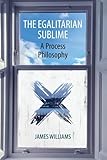The Egalitarian Sublime : A Process Philosophy / James Williams.
Material type: TextPublisher: Edinburgh : Edinburgh University Press, [2022]Copyright date: ©2019Description: 1 online resource (208 p.)Content type:
TextPublisher: Edinburgh : Edinburgh University Press, [2022]Copyright date: ©2019Description: 1 online resource (208 p.)Content type: - 9781474439114
- 9781474439138
- BH301.S7 W55 2019
- BH301.S7 W55 2019
- online - DeGruyter
| Item type | Current library | Call number | URL | Status | Notes | Barcode | |
|---|---|---|---|---|---|---|---|
 eBook
eBook
|
Biblioteca "Angelicum" Pont. Univ. S.Tommaso d'Aquino Nuvola online | online - DeGruyter (Browse shelf(Opens below)) | Online access | Not for loan (Accesso limitato) | Accesso per gli utenti autorizzati / Access for authorized users | (dgr)9781474439138 |
Frontmatter -- Contents -- Acknowledgements -- 1 Introduction -- 2 Microcritique and the Sublime -- 3 Nietzsche Against the Egalitarian Sublime -- 4 The Return to the Sublime -- 5 Sublime Miseries -- 6 Defining the Egalitarian Sublime -- 7 Conclusion: The Sublime as Crisis -- Notes -- Bibliography -- Index
restricted access online access with authorization star
http://purl.org/coar/access_right/c_16ec
Maps the history of the sublime to reveal its dark heart and creates a new, anarchic approachReassesses historical theories of the sublime from philosophers including Burke, Kant, Nietzsche and SchopenhauerCritiques the recent return to the sublime in Adorno, Lyotard, Brady, Nye, Zepke, Spuybroek and LloydFinds some of the most influential philosophies of the sublime to be unequal and unjustTakes a process philosophy approach to map the sublime through its effectsAgainst the unjust legacies of the traditional sublime, James Williams defends a new, anarchist sublime: multiple, self-destructive and temporary; opposed to any idea of highest value to be shared by all but always imposed on the powerless.We call 'sublime' those things and experiences supposed to be the very best. But what if the best encourages the worst? What if the best leads to inequality and exploitation? Williams critiques the sublime over its long history and in recent returns to sublime nature and technologies. Deploying a new critical method that draws on process philosophy, he shows how the sublime has always led to inequality. This holds true even where it underpins ideas of cosmopolitan enlightenment, and even when refined by Burke, Kant, Nietzsche, Schopenhauer and Žižek.
Mode of access: Internet via World Wide Web.
In English.
Description based on online resource; title from PDF title page (publisher's Web site, viewed 29. Jun 2022)


